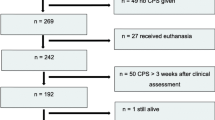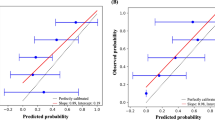Abstract
Purpose
The expected survival of patients with metastatic cancer can significantly impact decisions regarding treatment, care setting, and future planning. We evaluated the prognostication ability of a multidisciplinary team (MDT) experienced in providing supportive care and palliative radiotherapy.
Methods
After clinical assessment of consecutive patients, survival predictions were independently made by each MDT member. Patient demographics, factors influencing predictions, and dates of death were collected. Clinical predictions of survival (CPS) were considered correct if within 30 days of actual survival (AS). Summary statistics and Kaplan–Meier estimates of overall survival were obtained. Correlations between actual and CPS were calculated using Spearman's correlation coefficient. Multivariate logistic regression analysis identified factors associated with prognostication accuracy.
Results
A total of 395 predictions (06/2010–07/2012) were made by eight disciplines. Average age was 68 years, 68.3 % of patients were male, and 48.4 % had lung cancer. Median AS was 87 days (95 % CI 66–102 days). Survival was over-estimated 72.4 % (286/395) of the time with r = 0.54 (p < 0.0001) for all predictions across all disciplines. In addition, 30.3 % (36/119) of radiation therapist (RTT) predictions were correct compared to 30.1 % (22/73) of nurses', 28.7 % (43/150) of physicians', and 15.1 % (8/53) of allied health (AH) providers. There were no differences in accuracy by discipline except for the RTT versus AH groups (p = 0.04). Factors most frequently cited as influencing correct predictions were Karnofsky performance status (KPS), extent of disease, and histology. KPS was the only significant variable on multivariate analysis (p ≤ 0.04).
Conclusion
MDT members providing collaborative care for advanced cancer patients utilize similar factors in predicting survival with comparable accuracy.


Similar content being viewed by others

References
Glare P, Sinclair C, Downing M, Stone P, Maltoni M, Vigano A (2008) Predicting survival in patients with advanced disease. Eur J Cancer 44(8):1146–1156
Gripp S, Moeller S, Bolke E et al (2007) Survival prediction in terminally ill cancer patients by clinical estimates, laboratory tests and self-rated anxiety and depression. J Clin Oncol 25(22):3313–3320
Glare P (2005) Clinical predictors of survival in advanced cancer. J Support Oncol 3:331–339
Maltoni M, Caraceni A, Brunelli C et al (2005) Prognostic factors in advanced cancer patients: evidence-based clinical recommendations—a study by the steering committee of the European Association for Palliative Care. J Clin Oncol 23(25):6240–6248
Addington-Hall J, MacDonald L, Anderson (1990) Can the Spitzer Quality of Life Index help to reduce prognostic uncertainty in terminal care? Br J Cancer 62:695–699
Mackillop W, Quirt C (1997) Measuring the accuracy of prognostic judgments in oncology. J Clin Epidemiol 50(1):21–29
Gwilliam B, Keeley V, Todd C et al (2011) Development of prognosis in palliative care study predictor models to improve prognostication in advanced cancer: prospective cohort study. BMJ 343:4920–4934
Pearlman R (1988) Inaccurate predictions of life expectancy: dilemmas and opportunities. Arch Intern Med 148:2537–2538
Gwilliam B, Keeley V, Todd C et al (2012) Prognosticating in patients with advanced cancer—observational study comparing the accuracy of clinicians' and patients' estimates of survival. Ann Oncol 1–7
Hagerty R, Butow P, Ellis P et al (2005) Communicating with realism and hope: incurable cancer patients' views on the disclosure of prognosis. J Clin Oncol 23:1278–1288
Glare P, Virik K, Jones M et al (2003) A systematic review of physicians' survival predictions in terminally ill cancer patients. BMJ 327:195–198
Bruera E, Miller M, Kuehn N, MacEachern T, Hanson J (1992) Estimate of survival of patients admitted to a palliative care unit: a prospective study. J Pain Sympt Manage 7:82–86
Christakis N, Lamont E (2000) Extent and determinants of error in doctors' prognoses in terminally ill patients: prospective cohort study. BMJ 320:469–472
Vigano A, Dorgan M, Bruera E, Suarez-Almazor M (1999) The relative accuracy of the clinical estimation of the duration of life for patients with end of life cancer. Cancer 86:170–176
Heyse-Moore L, Johnson-Bell V (1987) Can doctors accurately predict the life expectancy of patients with terminal cancer? Pall Med 1:165–166
Hui D, Kilgore K, Nguyen L et al (2011) The accuracy of probabilistic versus temporal clinician prediction of survival for patients with advanced cancer: a preliminary report. Oncologist 16:1642–1648
Casarett D (2006) The median is not the (only) message. Ann Intern Med 145(9):700–701
Buchan J (1995) Nurses' estimations of patients' prognoses in the last days of life. Int J Pall Nurs 1(1):12–16
Glare P (2006) Prognostic factors in terminal cancer. In: Gospodarowicz M (ed) Prognostic factors in cancer, 2nd edn. Wiley-Liss, Hoboken
Hauser C, Stockler M, Tattersall M (2006) Prognostic factors in patients with recently diagnosed incurable cancer: a systematic review. Support Care Cancer 14(10):999–1011
Vigano A, Donaldson N, Higginson I et al (2004) Quality of life and survival prediction in terminal cancer patients: a multicenter study. Cancer 101:1090–1098
Twomey F, O'Leary N, O'Brien T (2008) Prediction of patient survival by healthcare professionals in a specialist palliative care inpatient unit: a prospective study. Am J Hosp Pall Med 25(2):139–145
Phillips D, Smith D (1990) Postponement of death until symbolically meaningful occasions. JAMA 263:1947–1951
Allison P, Guichard C, Fung K, Gilain L (2003) Dispositional optimism predicts survival status one year after diagnosis in head and neck cancer. J Clin Oncol 21:543–548
Schoenbach V, Kaplan B, Fredman L, Kleinbaum D (1986) Social ties and mortality in Evans County, Georgia. Am J Epidemiol 123:577–591
Gagnon L, Fairchild A, Pituskin E, Dutka J, Chambers C (2012) Optimizing pain relief in a specialized outpatient palliative radiotherapy clinic: contributions of a clinical pharmacist. J Oncol Pharm Pract 18(1):70–77
Danielson B, Fairchild A (2012) Beyond palliative radiotherapy: a pilot multidisciplinary brain metastases clinic. Support Care Cancer 20(4):773–781
Pituskin E, Fairchild A, Driga A et al (2010) Multidisciplinary team contributions within a dedicated outpatient palliative radiotherapy clinic: a prospective descriptive study. Int J Rad Oncol Biol Phys 78(2):527–532
Fairchild A, Pituskin E, Rose B et al (2009) The rapid access palliative radiotherapy program: blueprint for initiation of a one-stop multidisciplinary bone metastases clinic. Support Care Cancer 17(2):163–170
Forster L, Lynn J (1988) Predicting life span for applicants to inpatient hospice. Arch Intern Med 148:2540–2543
Bland M (2000) An introduction to medical statistics, 3rd edn. Oxford University Press, Oxford
Parkes C (1972) Accuracy of predictions of survival in later stages of cancer. BMJ 2:29–31
Morita T, Tsunoda J, Inoue S, Chihara S (2001) Improved accuracy of physicians' survival prediction for terminally ill cancer patients using the Palliative Prognostic Index. Pall Med 15:419–424
Kee F, Owen T, Leathem R (2007) Offering a prognosis in lung cancer: when is a team of experts an expert team? J Epidemiol Community Health 61:308–313
Clarke M, Ewings P, Hanna T, Dunn L, Girling T, Widdison A (2009) How accurate are doctors, nurses and medical students at predicting life expectancy? Eur J Int Med 20:640–644
Bruera E (2005) The clinical and research implications of survival prediction. J Sup Oncol 3:342–343
Oxenham D, Cornbleet M (1998) Accuracy of prediction of survival by different professional groups in a hospice. Pall Med 12:117–118
Llobera J, Esteva M, Rifa J et al (2000) Terminal cancer: duration and prediction of survival time. Eur J Cancer 36:2036–2043
Lamont E, Christakis C (2001) Prognostic disclosure to patients with cancer near the end of life. Ann Intern Med 134:1096–1105
Christakis N, Iwashyna T (1998) Attitude and self-reported practice regarding prognostication in a national sample of internists. Arch Intern Med 158(21):2389–2395
Chow E, Harth T, Hruby G, Finkelstein J, Wu J, Danjoux C (2001) How accurate are physicians' clinical predictions of survival and the available prognostic tools in estimating survival times in terminally ill cancer patients? A systematic review. Clin Oncol 13:209–218
Dawes R, Faust D, Meehl P (1989) Clinical versus actuarial judgement. Science 243:1668–1674
Acknowledgments
We are grateful to all Palliative Radiation Oncology multidisciplinary team members at the Cross Cancer Institute for their participation. Presented in part at the Supportive Care in Cancer 25th International Symposium, June 28–30, 2012, New York City, NY; ASTRO 54th Annual Meeting, Oct 28-Nov 1, 2012, Boston, MA; and the CARO Annual Scientific Meeting, 12–15 Sept 2012, Ottawa, ON. Recognized by the Multinational Association for Supportive Care in Cancer with a Young Investigator Award (B Debenham; 2012).
Conflict of interest
There are no actual or potential conflicts of interest to declare. There is no funding source to acknowledge. The authors have full control of all primary data which can be reviewed by the journal if requested.
Author information
Authors and Affiliations
Corresponding author
Rights and permissions
About this article
Cite this article
Fairchild, A., Debenham, B., Danielson, B. et al. Comparative multidisciplinary prediction of survival in patients with advanced cancer. Support Care Cancer 22, 611–617 (2014). https://doi.org/10.1007/s00520-013-2013-2
Received:
Accepted:
Published:
Issue Date:
DOI: https://doi.org/10.1007/s00520-013-2013-2



